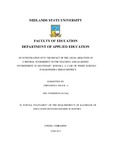Please use this identifier to cite or link to this item:
https://cris.library.msu.ac.zw//handle/11408/2775Full metadata record
| DC Field | Value | Language |
|---|---|---|
| dc.contributor.author | Chinomona, Grace A. | - |
| dc.date.accessioned | 2017-08-29T12:04:45Z | - |
| dc.date.available | 2017-08-29T12:04:45Z | - |
| dc.date.issued | 2017 | - |
| dc.identifier.uri | http://hdl.handle.net/11408/2775 | - |
| dc.description.abstract | Recently, corporal punishment has been legally abolished in Zimbabwean schools as well as in other various countries surrounding the world. This is in keeping with the international inclinations of being on familiar terms with the rights of the child specified in the Convention of the Rights of the Child and the Zimbabwean constitution at large. There are laws and regulations in Zimbabwean schools that forbid teachers from administering corporal punishment to learners. However, despite this move to legally abolish corporal punishment in schools, the media and limited research indicates that corporal punishment is still being used as a disciplinary method in Zimbabwean schools. Matope and Mugodzwa (2011) suggest that corporal punishment is still prevalent in Zimbabwean schools. In light of the above, this research was conducted to explore impact of the legal abolition of corporal punishment on the teaching and learning environment in secondary schools. The descriptive survey design was employed in the study and the sample was made up of 3 school heads, 3 heads of the guidance and counseling department, 6 guidance and counseling teachers and 75 ordinary level pupils. These were selected using convenient sampling, purposive sampling, simple random sampling and stratified random sampling. Of the eight schools in the Marondera urban district, 3 made up the sample and were conveniently selected. Personally distributed questionnaires, personal interviews and document analysis schedule were the instruments used to collect data. The gathered data was presented using graphs, pie charts and frequency tables. Comparative and thematic analysis of data followed the data presentation. The study found out that the legal abolition of corporal punishment in secondary schools pose a threat to the teaching and learning environment. Both teachers and pupils are not in agreement with the decision that was taken by the Zimbabwean government to legally abolish corporal punishment in schools. They attribute the lack of discipline amongst learners in secondary schools to this decision. As such the study recommends that teachers and pupils be made aware of the evils of corporal punishment. The study also recommends that pupils be made aware of the legal abolition of corporal punishment. The Ministry of primary and secondary education should come out with effective strategies, educate teachers on these strategies and make follow ups to ensure that school heads and teachers adopt a democratic and professional conduct in their interaction with students. | en_US |
| dc.language.iso | en | en_US |
| dc.publisher | Midlands State University | en_US |
| dc.subject | Corporal punishment | en_US |
| dc.title | An investigation into the impact of the legal abolition of corporal punishment on the teaching and learning environment in secondary schools: a case of three schools in Marondera urban district. | en_US |
| item.fulltext | With Fulltext | - |
| item.grantfulltext | open | - |
| item.languageiso639-1 | en | - |
| Appears in Collections: | Bachelor Of Education Honours Degree In History | |
Files in This Item:
| File | Description | Size | Format | |
|---|---|---|---|---|
| DISSERTATION 3333.pdf | Full Text | 1.63 MB | Adobe PDF |  View/Open |
Page view(s)
190
checked on Dec 30, 2025
Download(s)
594
checked on Dec 30, 2025
Google ScholarTM
Check
Items in MSUIR are protected by copyright, with all rights reserved, unless otherwise indicated.



